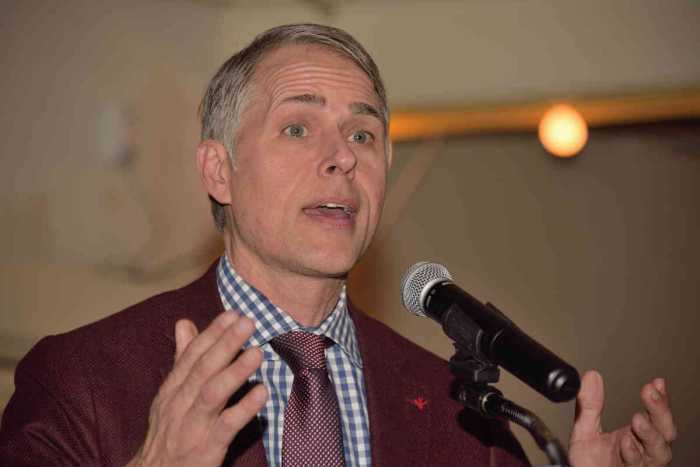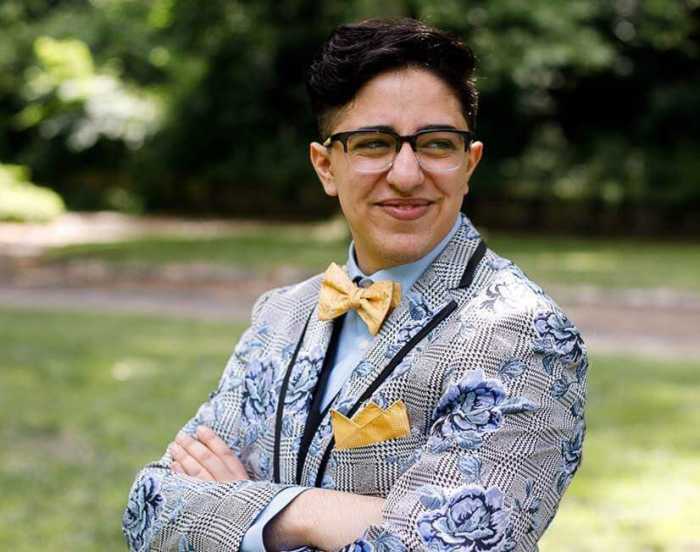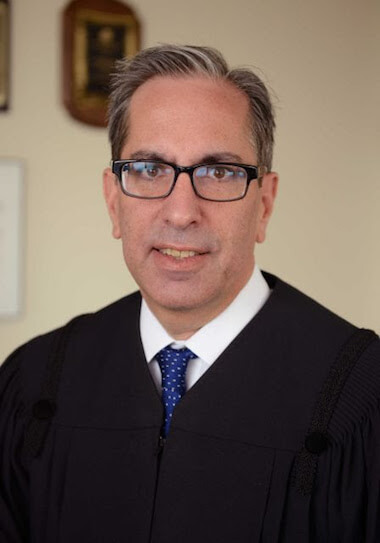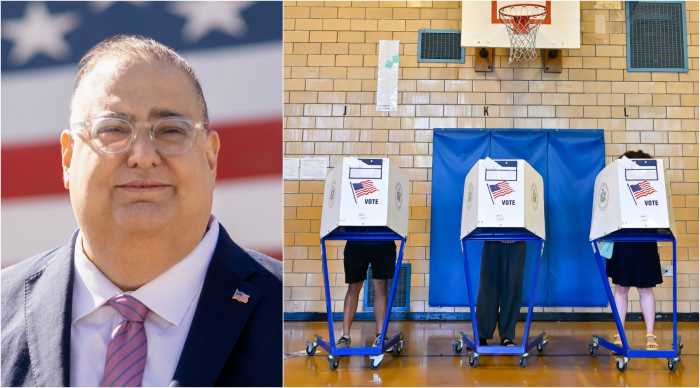Newfest, New York’s LGBTQ+ film festival, opens October 13 with “Mama’s Boy,” a documentary based on “Milk” screenwriter Dustin Lance Black’s relationship with his Mormon mother. The festival closes on October 25 with a screening of Laura Poitras’ documentary “All the Beauty and the Bloodshed,” about Nan Goldin. In between there are premieres of 130 films from 23 countries along with anniversary screenings of Tom Kalin’s “Swoon,” the documentary “The Cockettes,” and special events, including a “Xanadu” sing-along.
Here is a rundown of 16 films to catch at this year’s fest.
“Chrissy Judy”
The New York centerpiece screening, “Chrissy Judy,” is writer/director/star Todd Flaherty’s luminous comedy-drama about two New York drag artists, Judy (Flaherty) and his ride or die, Chrissy (Wyatt Fenner). When Chrissy drops a bombshell that he is moving to Philadelphia to live with his boyfriend Shawn (Kiyon Spencer), Judy’s world — along with his sense of security — falls apart. Judy’s solo show is unsuccessful and his hookups with Marcus (Joey Taranto) causes him personal and professional problems.
Things come to a head when Judy has an unpleasant visit with Chrissy in Philly. Judy is a handful, and Flaherty plays up his self-destructive nature, which can be off-putting. But the film turns a corner as Judy makes a fresh start, taking a job in Provincetown and experiencing some personal growth. Gorgeously lensed in black and white, and featuring songs and performances that comment on Judy’s emotions, “Chrissy Judy” is an astute examination of codependent queer friendships.
“Nelly and Nadine”
The documentary centerpiece, “Nelly and Nadine,” uncovers the hidden history and “double lives” of its titular subjects, Nelly Mousset-Vos and Nadine Hwang. They met in the Ravensbrück concentration camp and began a romance that continued after the war. Filmmaker Magnus Gertten follows Nelly’s granddaughter, Sylvie, as she pieces together the story through letters, diaries, photographs, Super-8 films, and interviews with folks who knew the couple. This lyrical, inspiring, and moving documentary recounts Nelly and Nadine’s experiences during the war, as well as their hope and will to both survive and be together.
“My Emptiness and I”
“My Emptiness and I” is a wonderful comedy-drama about Raphaëlle (cowriter Raphaëlle Pérez), a trans woman navigating the dating scene and her gender identity. She wants someone to love her as she is — she is deciding about having surgery — but most men are wary, if not downright obnoxious when it comes to dating a trans woman. Raphaëlle meets regularly with other trans women and participates in artistic endeavors, such as a play, that help her determine what she wants and who she is. “My Emptiness and I” is a fantastic showcase for Pérez, and a charming and hopeful love story wrapped in a poignant drama about self-acceptance.
“Lonesome”
Sure to have tongues wagging and hearts beating fast is Australian writer/director Craig Boreham’s erotic romance, “Lonesome.” Casey (Josh Lavery in a star-making performance) is a cowboy hitchhiking his way to Sydney hoping to see the ocean and escape his sordid past. Hooking up with Tib (Daniel Gabriel), Casey ends up befriending the young man, staying and working with him; their bromance-with-benefits is sweet. “Lonesome” will be most appreciated for the attractive actors’ near-constant nudity and copious sex scenes. The magnetic Lavery gives a flinty turn as Casey, who absorbs and endures considerable psychological and physical abuse. “Lonesome” features a familiar and obvious plot, which makes the film feel only skin deep — but the emphasis here is on skin.
“All Man: The International Male Story”
This is a zippy documentary, narrated by out gay actor Matt Bomer, that recounts the history of the male — er, mail — order magazine/catalog that featured masculine guys modeling non-masculine outfits. The “magalog” appealed to both straight men’s aspirations as well as gay men who — ahem, appreciated — the handsome guys. “International Male” was the brainchild of Gene Burkard, a gay man who sold a “lifestyle” and caught a wave — only to be disrupted first by the AIDS epidemic, then by selling out to Hanover Direct, who mainstreamed the brand. “All Man” features interviews with employees, several male models, fashion experts, and gay celebrities who acknowledge the impact of this “cash cow parody.” It may have been selling sex, but as “All Man” shows, its value-added benefit was providing an outlet for gay men to look at men.
“Esther Newton Made Me Gay”
“Esther Newton Made Me Gay” is a valentine to the titular cultural anthropologist and dog agility trainer. Director Jean Carlomusto traces Newton’s life, from her childhood and self-awareness about her sexuality and butch identity — as well as her first lesbian experiences — to her activism (“The personal is political”). Inspired by Margaret Mead and Gertrude Stein, Newton forged a path for queer studies in academia, writing about drag artists and gender roles. “Esther Newton Made Me Gay” celebrates the life, loves, and influence of this pioneering figure in queer studies.
“Keep the Cameras Rolling: The Pedro Zamora Way”
Another documentary, “Keep the Cameras Rolling: The Pedro Zamora Way” is a sincere tribute to the late HIV-positive Pedro Zamora, whose appearance on MTV’s “The Real World” has tremendous socio-cultural impact. Directors William T. Horner and Stacey Woelfel use interviews with Zamora’s sister Mily and his father, as well as archive footage to (re)acquaint viewers with Zamora, a gay man who came to Miami from Cuba when he was 8. They talk about his AIDS activism, and his life before he joined the cast of “The Real World” in 1994.
“Keep the Cameras Rolling” features interviews with a handful of the show’s cast members about their memories of Pedro, recounting the impact of having an HIV-positive housemate as well as the influence Zamora had educating viewers and changing minds about living with AIDS. His groundbreaking work includes kissing and “marrying” his boyfriend Sean Sasser on the show, but as Horner and Woelfel emphasize, it was how Pedro represented love and life, even as his health worsened. This is a poignant documentary about Zamora’s important legacy.
“Please Baby Please”
The gender-bending musical drama, “Please Baby Please,” is a very peculiar, highly stylized but uneven film. Arthur (Harry Melling) and Suze (a very expressive Andrea Riseborough) have a life-changing encounter with Teddy (Karl Glusman) and his gang, The Young Gents. The film, directed and cowritten by Amanda Kramer, is affected with both camp and 50s-era sensibilities that will charm or annoy. Kramer candy-coats each scene and fetishizes its characters — Teddy especially (Glusman oozes sex appeal) — as they pose, fight, sing, and dance.
“Please Baby Please” is not just all mood, though. Its characters espouse heady comments about gender, masculinity, and vulnerability. Harry claims he “doesn’t feel a need to act male,” while Suze becomes more masculine over the course of the story. There are also some nifty musical numbers and striking vignettes, from one featuring Maureen (Demi Moore) as a “slum starlet” neighbor, to a scene in a club with a flirty gay character, and another sequence at a Bijou movie theater. “Please Baby Please” can feel like it is trying too hard, but it is a unique and, at times, impressive accomplishment.
“El Houb—The Love”
“El Houb — The Love” has Karim (Fahd Larhzaoui) literally locking himself in a closet in his parents’ house to get them to acknowledge his homosexuality after Karim’s father, Abbas (Slimane Dazi) caught his son with Kofi (Emmanuel Ohene Boafo). The film, which can feel stagy, is opened up with flashbacks to Karim’s childhood, scenes depicting his bond with his gay cousin, Soufian (Nasrdin Dchar), as well as his relationship with his girlfriend, Eline (Britte Lagcher), and his lover, Kofi. The approach creates a prismatic view of Karim’s life, which is full of self-hate, and struggles. Moreover, in his exchanges with his mother Fatima (Lubna Azabal) and brother Redouan (Sabri Saddik) things are magnified and reevaluated. “El Houb” is a compelling drama about acceptance and shame, shrewdly conceived and filmed and well-acted by the entire ensemble cast.
“Before I Change My Mind”
Set in 1987 Canada, “Before I Change My Mind” has Robin (Vaughan Murrae) reluctantly befriending Carter (Dominic Lippa), a school bully. They bond during a school trip, but things get complicated when they meet Izzy (Lacey Oake) at an ersatz theatrical production of “Jesus Christ Superstar” (the show is the film’s lowest point). Carter is attracted to Izzy, Robin is attracted to Carter, and Izzy is attracted to Robin. The LGBTQ angle here is that Robin’s gender is ambiguous. That makes for a possibly interesting examination of identity, but director/cowriter Trevor Anderson fails to explore these themes in any depth, which is one of many drawbacks for this well-meaning but flawed film best suited for younger viewers.
This year, NewFest is showcasing a half-dozen queer films from Brazil.
“Mars One”
Writer/director Gabriel Martins’ involving drama depicts the dignity of a lower middle-class Black Brazilian family. Wellington (Carlos Francisco) is the patriarch, who works at a luxury apartment building. He is underpaid, but he engenders respect with the manager and his coworkers. His wife, Tércia (Rejane Faria), cleans houses, but she has had a hard time finding work of late. Her troubles are compounded after she is in a café where a bomb goes off. Surviving the attack, she feels she is bringing bad luck on everyone around her.
Meanwhile, their daughter Eunice (Camilla Damião) is planning to move in with her girlfriend, Joana (Ana Hilario). They have been “looking” at apartments and having sex in the empty spaces. Her brother, Deivinho (Cícero Lucas) plays soccer, but he would rather study astrophysics. How their lives and storylines play out in this modest film is absorbing. A scene of the girls holding hands when Joana is introduced to Eunice’s parents is both sweet and prickly. But the love this family feels for one another through the difficulties they experience resonates.
“Three Tidy Tigers Tied a Tighter Tie”
“Three Tidy Tigers Tied a Tighter Tie” is Gustavo Vinagre’s whimsical comedy about two roommates — sex worker Pedro (Pedro Ribeiro) and student Isabella (Isabella Pereira) — spending the day with Pedro’s nephew, Jonata (Jonata Vieira), who has come to the city for his HIV treatment. Shot during the pandemic, amnesia seems to be the overriding symptom as various characters have memory issues. There is a sweet scene of Jonata cracking a man’s back in Roosevelt Park and a tender moment between Pedro and his client Omar (Everaldo Pontes), but much of this subversive film is addressing issues of race and class — there are several references to ‘crapitalism” — as well as regression and oppression.
Vinagre has concocted a shaggy hangout film with moments of magical realism, as well as a strange musical sequence. This is ambitious and inventive film but may not be for all tastes, but it certainly has its charms. (The film is also screening at the New York Film Festival, October 13 and 14 with Vinagre in attendance)
“Follow the Protocol”
The topical drama, “Follow the Protocol” has Francisco (writer/director Fábio Leal) lonely and horny after almost a year in lockdown. He fills his days with mundane tasks, like watering his plants, dyeing his hair, and exercising, but he really just wants to have sex. When he reconnects with Raul (Paulo César Freire), an old friend/flame, they initially touch each other through a plastic curtain, but soon they get more intimate, and Francisco gets more anxious. However, their tenderness is sweet compared to a rougher encounter Francisco has with another guy (Lucas Drummond) he has over. Follow the Protocol is all about Francisco finding his comfort zone, and viewers will be rooting him on, or squirming along with him. This is gentle, romantic gay drama for the pandemic.
“Uýra – The Rising Forest”
The exotic documentary “Uýra – The Rising Forest” is a deep dive into the rainforest of Manaus in the Amazon, where Emerson, aka Uýra Sodoma, a non-binary, trans indigenous artist, leads workshops and non-traditional drag performances to raise awareness for environmental issues and protest against deforestation.
The film, directed by Juliana Curi, features striking images of body painting and performances as well as political messages about identity, water and land rights, as well as racism and the erasure of history and ancestors.
“Rule 34”
“Rule 34” is director Julia Murat’s intriguing investigation of racial, class, gender, and sexual power dynamics. Simone (Sol Miranda) participates in sex cam work while also attending law school to become a public defender. Her classroom discussions address various forms of oppression and her work helping physically and psychologically abused women soon take an emotional toll on her. This may be why she starts exploring her sexual desires and getting involved in BDSM for her followers.
“Rule 34” also depicts Simone’s relationships with her girlfriend Natalia (Isabela Mariotta); Joaquim, aka Coyote (Lucas Andrade), her queer classmate and occasional webcam partner; and Lucia (Lorena Comparato) who has concerns about Simone’s increasingly harmful behavior. This engaging film is sometimes disturbing, but it wisely does not judge Simone. Miranda gives an intense, ingratiating performance as a young woman in control but also capable of losing control.
“The First Fallen”
“The First Fallen” is set largely in 1983, when gay Suzano (Johnny Massaro), his trans friend Rosa (Renata Carvalho), as well as their friend Humberto (Vitor Camilo) are all living with AIDS. While the first act introduces these characters, detailing their lives, the film’s power comes from an extended sequence where the three friends examine their lives, giving impassioned speeches that express their attitudes about living and dying and how their lives have changed. This is an emotional film that captures the uncertainly around AIDS in its early years, and it is heartbreakingly performed.
“NewFest” | October 13-25, at various theaters and virtually | For tickets, showtimes, and more information, visit https://newfest.org/festival/



































